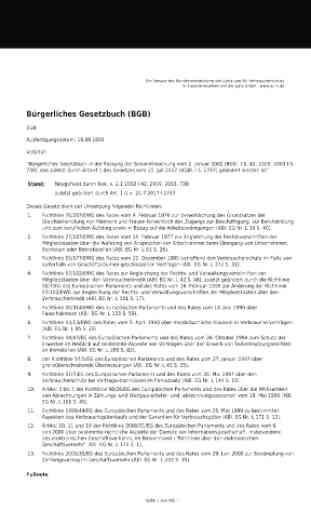Bürgerliches Gesetzbuch (BGB)
The Civil Code (BGB) regulates a central codification of the German general private law the main legal relations between private individuals. It is the general private law with its Nebengesetzen (z. B. Property Act, insurance contract law partnership law General equality law). However it does not provide complete codification of civil law.
Characteristics:
- The search function with full text quickly leads to the searched term (s).
- You can also enter several terms (eg 'child entertaining before')
- Seeking terms are highlighted in the text
- Navigation within each law on a table of contents.
- App has day and night mode.
- App allows sharing of content.
- The Internet permission is used for the reporting of unexpected errors and advertising.
- An Internet connection to use is not necessary. Without an Internet connection the ads are turned off.
App currently includes the following laws:
- Civil Code
- Condominium Act
- Insurance Contract Law
- Civil Partnership Act
- General equality law
- BGB Information Duties Regulation
- Beurkundungsgesetz
- leasehold law
- Injunction Act
- Product Liability Act
- EC Consumer Protection Enforcement Act
The laws come from the website of the Federal Ministry of Justice (BMJ).
http://diegesetze.de/
The Civil Code (BGB) is the central codification of German general private law, wherein citizens in the sense of citizens (civis) is understood. The Civil Code governs the legal relationship between individuals and thus stands in contrast to public law. Along with its by-laws (such as the Property Act, insurance contract law partnership law generally equal treatment law), it is the general private law. In addition to general private law in addition with the special privacy rights, hold the special rules for certain subjects or occupational groups, the rules applicable to merchants norms of commercial law or collective bargaining rules of labor law. Nevertheless offers the BGB, together with the called "Annex" not a complete codification of civil law. [1]
After many years of consulting in two lawyers commissions and public debates the BGB 1 occurred at the time of the German Empire on January 1, 1900 by Art. Of the Introductory Act to the Civil Code (BGB) in force (RGBl. 1896, p 195). It was the first private law codification which had validity for the entire Reich. The BGB after the Second World War in the Federal Republic of Germany as federal law under Art. 123 para. 1 and Art. 125 of the Basic Law continues.
The legislator has since made many changes to the Civil Code. Reforms he is often faced with the decision whether to approve the reform bill as amendments or supplements to the Law of the Civil Code or a special law outside the BGB. The practical effect is uneven. To a clear line, the legislature has not struggled through to this day. Overall, the entire codification of civil law has steadily grown, loss of substance, however, keep within manageable limits. Losses are found, however, so far, have been superimposed as a regulatory matters in the law of obligations ranging from layers of case law. [2] On January 2, 2002 was carried out as part of the comprehensive reform of the law of obligations, a new publication of the Civil Code. [3] The text has been adapted to the new German spelling. In addition, each section was given a heading.
Characteristics:
- The search function with full text quickly leads to the searched term (s).
- You can also enter several terms (eg 'child entertaining before')
- Seeking terms are highlighted in the text
- Navigation within each law on a table of contents.
- App has day and night mode.
- App allows sharing of content.
- The Internet permission is used for the reporting of unexpected errors and advertising.
- An Internet connection to use is not necessary. Without an Internet connection the ads are turned off.
App currently includes the following laws:
- Civil Code
- Condominium Act
- Insurance Contract Law
- Civil Partnership Act
- General equality law
- BGB Information Duties Regulation
- Beurkundungsgesetz
- leasehold law
- Injunction Act
- Product Liability Act
- EC Consumer Protection Enforcement Act
The laws come from the website of the Federal Ministry of Justice (BMJ).
http://diegesetze.de/
The Civil Code (BGB) is the central codification of German general private law, wherein citizens in the sense of citizens (civis) is understood. The Civil Code governs the legal relationship between individuals and thus stands in contrast to public law. Along with its by-laws (such as the Property Act, insurance contract law partnership law generally equal treatment law), it is the general private law. In addition to general private law in addition with the special privacy rights, hold the special rules for certain subjects or occupational groups, the rules applicable to merchants norms of commercial law or collective bargaining rules of labor law. Nevertheless offers the BGB, together with the called "Annex" not a complete codification of civil law. [1]
After many years of consulting in two lawyers commissions and public debates the BGB 1 occurred at the time of the German Empire on January 1, 1900 by Art. Of the Introductory Act to the Civil Code (BGB) in force (RGBl. 1896, p 195). It was the first private law codification which had validity for the entire Reich. The BGB after the Second World War in the Federal Republic of Germany as federal law under Art. 123 para. 1 and Art. 125 of the Basic Law continues.
The legislator has since made many changes to the Civil Code. Reforms he is often faced with the decision whether to approve the reform bill as amendments or supplements to the Law of the Civil Code or a special law outside the BGB. The practical effect is uneven. To a clear line, the legislature has not struggled through to this day. Overall, the entire codification of civil law has steadily grown, loss of substance, however, keep within manageable limits. Losses are found, however, so far, have been superimposed as a regulatory matters in the law of obligations ranging from layers of case law. [2] On January 2, 2002 was carried out as part of the comprehensive reform of the law of obligations, a new publication of the Civil Code. [3] The text has been adapted to the new German spelling. In addition, each section was given a heading.
Category : Books & Reference

Related searches


